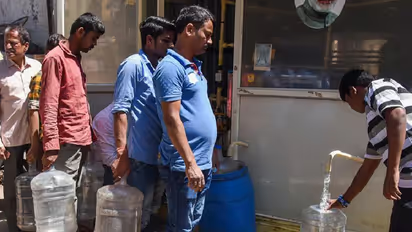Bengaluru water crisis: Dangerous bacteria found in drinking water plant, raises concerns

Synopsis
Bengaluru faces a water crisis due to dangerous bacteria contaminating drinking water sources. BBMP has suspended supply from ten affected units and initiated chlorination. Deputy CM emphasizes water quality assessment, threatening action against negligent officials. Extensive testing is underway, with 474 reports indicating contamination.
Bengaluru is grappling with a concerning water crisis as reports surface of dangerous bacteria contaminating water supplied from multiple drinking water plants and tube wells across the city. Following the alarming discovery, authorities have taken swift action, suspending water supply from ten affected units and tube wells.
The contamination was first identified in Bommanahalli, with five bacteria strains detected, followed by two in both the East and South Zones, and one in the Mahadevapura Zone. To mitigate the risk posed by the bacteria, the Bruhat Bengaluru Mahanagara Palike (BBMP) has initiated chlorination processes in the affected units and tube wells to eliminate the harmful pathogens.
Bengaluru now at ease: Water crisis relieved as BWSSB reports overflow of reservoirs
This recent development comes in the wake of similar incidents reported last May, where contaminated water infiltrated drinking water sources in certain areas of the state. In response to these recurring concerns, the Deputy Chief Minister has emphasized the urgent need to assess the overall water quality supplied to Bengaluru. Moreover, he has issued a stern warning, stating that disciplinary measures will be taken against any negligent officials if the contaminated water leads to health issues among the populace.
In efforts to comprehensively address the situation, extensive water quality testing has been initiated. Out of the 217 tube wells and 1,384 drinking water plants scattered throughout the city, samples from 217 tube wells and 1,218 drinking water plants have been collected and sent for laboratory analysis. As of now, 474 lab test reports have been obtained, revealing contamination in ten water sources. However, results from an additional 805 sites are still pending, raising concerns of potential widespread contamination.
Karnataka: Bengaluru's water woes worsen as over 100 lakes dry up, over 20 on the brink
To expedite the testing process and ensure the timely assessment of water quality, the BBMP Health Department has decided to employ micro-biological tests using 'H2S' kits. Should any deficiencies be identified during this rapid screening, further laboratory analysis will be conducted on the samples.
In a proactive move, the BBMP Health Department has planned to conduct approximately 3,000 micro-biological tests, covering various water sources including tube wells, drinking water plants, and water storage centres. Kits for these tests will be procured at the zonal level, with each kit estimated to cost around Rs. 50. Special Commissioner of the BBMP Health Department, Vikas Kishore Suralkar, has underscored the urgency of the situation, granting a one-week timeframe for the completion of these tests.
Stay updated with the Breaking News Today and Latest News from across India and around the world. Get real-time updates, in-depth analysis, and comprehensive coverage of India News, World News, Indian Defence News, Kerala News, and Karnataka News. From politics to current affairs, follow every major story as it unfolds. Download the Asianet News Official App from the Android Play Store and iPhone App Store for accurate and timely news updates anytime, anywhere.